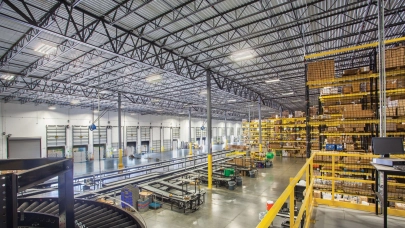
Advances in AI applications are already causing revolutionary changes in the commercial real estate field, and we’ll continue to see a shift in the way real estate professionals do business in the years to come. With PropTech start-ups increasingly offering technologically innovative products and business strategies for the real estate market, Instant Offices looked at some of the top predicted AI trends that PropTech companies will be bringing into the real estate market in the next two years.
Augmented and virtual reality
- Applications: VR can be used to provide customers with virtual tours, allowing prospective tenants and buyers to view properties on the other side of the globe, or even to get a look inside properties that haven’t been built yet. Augmented reality, which overlays virtual objects on top of a real-world environment, can help agents to enrich their in-person property tours.
- Benefits: This technology makes it easier for agents to sell to clients anywhere in the world and gives clients the confidence to make a decision knowing exactly what they are buying or letting.
- Insight: According to a 2018 VR survey, real estate will be one of the top drivers of investment in virtual and augmented reality technologies in the coming year.
Biometrics
- Applications: Technologies like voice commands and facial recognition are being used to improve security in commercial buildings.
- Benefits: Biometric technologies offer better safety and security for clients, which is especially useful for those who work with sensitive information.
Bots
- Applications: AI applications like chatbots can be made available to customers 24 hours a day, seven days a week. This helps commercial real estate agencies to provide clients around the world with readily available support, any time of the day or night.
- Benefits: Using bots helps agents to provide customers with better accessibility, irrespective of their schedule or the customer’s time zone.
Cryptocurrency and blockchain
- Applications: Blockchain-based smart contracts are set to become more widely used in the world of commercial real estate.
- Benefits: Blockchain can negate the need for any third-parties in a real estate transaction, while cryptocurrencies like Bitcoin are also gaining traction, reducing the need for notaries, lawyers and title holders.
Data analysis
- Applications: AI can analyse huge amounts of data to help agents match the right properties to the right customers in a short space of time.
- Benefits: Data analysis helps providers offer more targeted marketing and tailored solutions to their customers.
- Insight: According to a 2016 Gartner report, at least 30% of companies globally will be using AI in at least part of their sales processes by 2020.
Data visual tech
- Applications: Drones can be used to capture footage of properties and their surroundings for use in virtual tours, and to produce videos of areas that are undergoing development or upgrades.
- Benefits: Using visual data technologies, agents can provide customers with an in-depth look at potential properties and locations.
Geolocation tech
- Applications: AI draws critical data about properties from maps of their location. This data can be analysed and used to predict future changes and trends. For example, AI can use data about development plans in a geographical area to predict the price of property in that area.
- Benefits: Geolocation tech can give agencies valuable insights into up-and-coming areas as well as trends in their prospective clients’ preferences.
Internet of Things
- Applications: IoT is everywhere, with more and more real-world items being equipped with sensors that can be read by Internet applications and translated into data. This applies to buildings too.
- Benefits: IoT makes it possible to build “smarter” properties, which are tailored to the needs of those occupying them.
- Insight: The Edge in Amsterdam is a 15-storey office building embedded with 28,000 sensors. It is widely regarded as the smartest building in the world.
In a nutshell, AI helps to make real estate sales and rentals quicker and easier for customers and providers. The right AI application can save a lot of time and hassle all around by making the process more targeted and efficient, and by providing virtual support.
Real-World examples
Here are some examples of how some companies around the world are using AI to transform commercial real estate.
- CityBldr, Seattle: CityBldr uses an AI platform to locate deals and rank properties based on their development potential. The AI can also estimate the anticipated return on investment of each property.
- BioConnect, Toronto: This company uses biometrics to improve and personalise building security. The platform identifies users based on unique physical qualities such as their face, eyes, heartbeat and fingerprints. It also offers a product that combines a dual-factor fingerprint and card lock system for data centre server cabinets.
- Skyline AI, Tel Aviv: Skyline is partnering with Greystone Labs to analyse key industry insights, which they plan to use to improve deal performance and the loan underwriting process.
According to Research and Markets, AI revenue will reach $38.8 billion by the year 2025. With so many innovative applications helping to improve, customise and automate everyday business processes, it’s no wonder AI in real estate will continue to grow by leaps and bounds.



